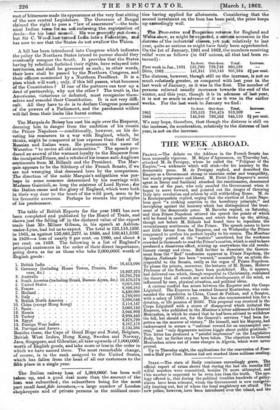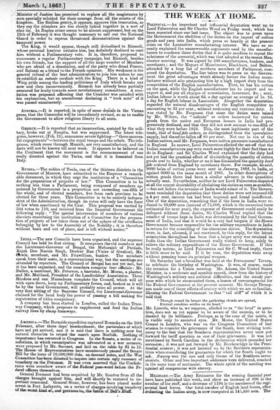THE WEEK ABROAD.
FBANCE.—The debate on the Address in the French Senate has been unusually vigorous. M. Sigur d'Aguesseau, on Thursday last, attacked M. de Persigny, whom he called the "Polignac of the Empire,"—a nickname which will stick—for his leniency to the democratic press. M. de Persigny. replied, and described the Empire as a Government strong to maintain order and tranquillity, but wisely progressive and' liberal. M. Pietri (the Emperor's secret agent in Savoy and Sardinia) attacked the reactionaries, denounced the men of the past, who only assailed the Government when it began to move forward, and pointed out the danger of throwing Italy into revolution and schism by still withholding Rome. M. de la Rochejacquelein replied, urging that the election of Lords Napo- leon ense "a striking sanction to the hereditary principle," and inveigling against the leniency which has. distinguished the treat- ment of the democratic press. AL Baroche replied, on Saturday, and then Prince Napoleon uttered the speech the points of which will be found in another column, and which broke up the sitting, though not beforn M. BillAnit had found time to repudiate the revolutionary sentiments of the Prince. The speech seems to have met little favour from the Emperor, and on Wednesday the Prince reappeared to profess his perfect loyalty to his cousin. The Moniker is usually posted at the mairies" unnoticed, but the workmen crowded in thousands to read the Prince's oration, which is said to have produced a disastrous effect, stirring up everywhere the old revolu- tionary energy and virus. Still further to dissociate the Govern- ment from the "Red" tendencies apparent in Prince Napoleon, the Opinion Nationale has been "warned," nominally, for an article ills- respectful to the Senate, really as the organ of Prince Napoleon. To please the priests, moreover, the lectures of IL Renan, Hebrew Professor of the Sorbonne, have been prohibited. He, it appears, had delivered one which, though respectful to Christianity, contained the theory that all creeds are natural developments of the mind, as influenced by race, physical situation, and political ideas. A curious conflict has arisen between the Emperor and the Corps Legislatif. The Emperor has created General Montauban, who com- manded the expedition to China, Count de Palikao, and a Senator, with a salary of 1200/. a year. He has also recommended him for a dotation, or life pension of 2000/. This proposal was received in the Corps Legislatif with a storm of disapproval which irritated the Emperor, who published in the Moniker a letter addressed to General Montauban, in which he stated that he had been advised to withdraw the bill, but should not, for the General's services "had been for- gotten on the morrow of victory." He himself, said his Majesty, had endeavoured to secure a "national reward for an unexampled suc- cess," and "only degenerate nations higgle about public gratitude." This letter has produced a "painful impression" on the Legislative Body, but no farther step has been taken. The objection to General Montauban arises out of some charges in Algeria, which were never proved. Up to Thursday night, the applications for the conversion of Pour- and-a-Half per Cent. Rentes had not reached three millions stealing.
ITALY.—The state of Sicily continues exceedingly grave. The official report of crime shows that during the last six months 227 wilful murders were committed, besides 76 more attempted, and this number is supposed to be even less than the truth. The apo- logy offered is, that during the political troubles hundreds of galley- slaves have been released, whom the Government is now energetic- ally hunting out, but of whom the local magistracy are afraid. The new police, however, have been introduced over the island, and the
Minister of Justice has promised to replace all the magistrates by men specially selected for their courage from all the courts of the kingdom. The Sicilian gentry, it appears, approve this innovation, as they say the islanders are too closely linked together in a sort of clan tie. In Naples crime seems to be almost suppressed, but on the 15th of February it was thought necessary to call out the National Guard in order to repress threatened demonstrations against the temporal power.
The King, it would appear, though still disinclined to Rieasoli, whose personal hauteur irritates him, has definitely declined to oust him without a Parliamentary vote. It is, therefore, proposed to commence a regular Parliamentary campaign, but Rieasoli, besides his own friends, has the support of all the large number of Members who are afraid of a dissolution, and of the party who dread France, .and Ratazzi as a friend to the French opinions. His weakness is the general refusal of the best administrators to join him unless he can re-establish an entente cordiale with the King. There is a kind of Whig pride among the leading politicians of Italy which breaks out now and then inconveniently. Ricasoli has already been partially censured for lenity towards some revolutionary committees. A reso- lution was proposed affirming that the Chamber was satisfied with his explanation, but an amendment declaring it "took note" of it was passed unanimously.
Ausrate.—It is reported, in spite of some denials in the Vienna press, that the Concordat will be immediately revised, so as to enable the Government to allow religious liberty to all sects.
Giteecz.—It is reported that an insurrection, assisted by the mili- tary, broke out at Nauplia, but was suppressed. The latest tele- gram, however, (Feb. 15), announces severe fighting—" three success- ful engagements"—between the royal troops and the rebels. The tele- grams, which come through Munich, are very unsatisfactory, and the facts will not be known till next week. It appears to be believed on the Continent that the movement is the commencement of one really directed against the Turks, and that it is fomented from Italy.
R.-assts.—The nobles of Toula, one of the thirteen districts in the Government of Moscow, have submitted to the Emperor a remark- able document, in which they urge the institution of a "Committee for the preparation of_projects of law." This Committee is to be nothing; less than a Parliament, being composed of members ap- pointed by Government in a proportion not exceeding one-fifth of the whole, and of elected members, five from each province to be elected for three years. This Committee is to be entirely indepen- dent of the Administration, though its votes will only have the force of law when sanctioned by the Czar. This proposal was carried by :344 votes to 110, and received from the Imperial Government the following reply: "The special intercession of members of various districts concerning the institution of a Committee for the prepara- tion of projects of law takes them out of the sphere of the attributes belonging by law to the Assembly of the Nobility ; it is therefore without basis and out of place, and is left without notice."
Irrnre.—The new Councils have been organized, and the supreme Council has held its first sitting. It comprises the old, members and the Lieutenant-Governor of Bengal, the Maharajah of Puttiala, Rajah Deo Narain Singh, Denkur Rao (Vizier of Gwalior), Mr. Obwie, merchant, and Mr. Fitzwilliarn, banker. The members speak from their seats, in a conversational way, but the meetings are attended by reporters. The Council of Bengal has not yet met, but it has been organized, and the members comprise four officials : Mr. ,Bullen, a merchant, Mr. Peterson, a barrister, Mr. Moran, a planter, and Mr. Maitland, President of the Landholders' Association. Three Hindoos and one Mussulman complete the Council, which will sit with open doors, keep up Parliamentary forms, and, backed as it will be by the local Government, will probably seize all power. At the very first sitting of the Supreme Council, the Lieutenaut-Governor claimed for the local body the power of passing a bill making the registration of titles compulsory.
A company has been started in London, called the Indian Tram- way Company, which proposes to supplement awl feed OA Indian railway lines by cheap tramways.
AMERICA.—The Burnside expedition captured Roanoke on the Mb February, after three days' bombardment, the particulars of which have not yet arrived, and it is said that there is nothing now but natural obstacles to retard the march upon Norfolk. Nothing of importance hais oecurred in Congress. In the Senate, a series of re- solutions, in which emancipation was advocated as a war measure, were proposed by Mr. Sumner, and laid on the table by 21 to 15. The House of Representatives have unanimously passed the Senate Bill for the issue of 10,000,000 dots, on demand notes, and the War Committee has been direetedlo inquire into certain ugly rumours of treachery on the Potomac. It was even asserted that the Confede- rates were somehow aware of the Federal pass-word before the Fe- deral officers themselves.
General Fremont had been acquitted by Mr. Stanton from all the charges brought against him, and will shortly be restored to im- portant command. General Stone, however, has been placed under arrest in Fort Lafayette, on a series of chargea involving treachery
of the. wont at,_antl wevionalo, the Wale of 1301I'a Blue.































 Previous page
Previous page